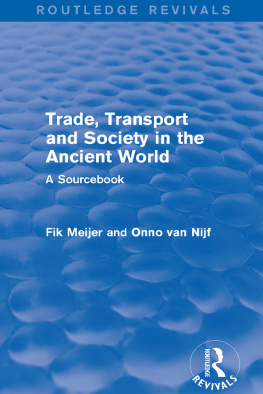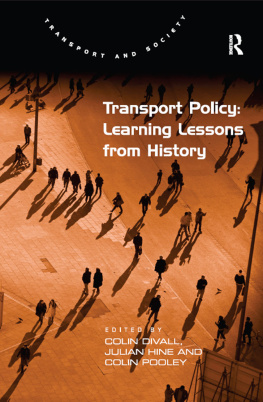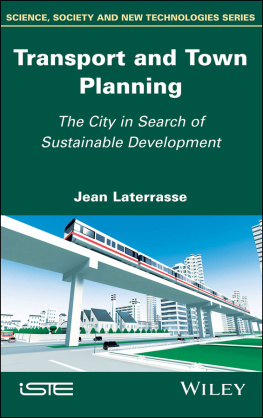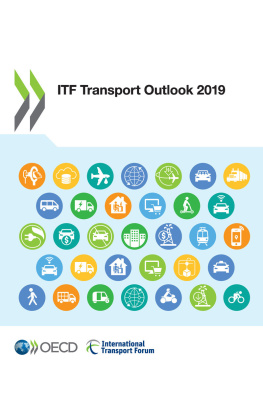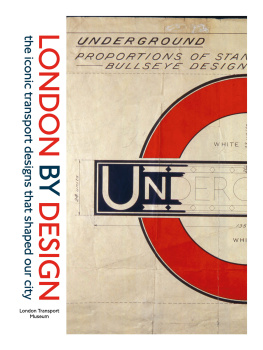INTEGRATED FUTURES AND TRANSPORT CHOICES
Integrated Futures and Transport Choices
UK Transport Policy Beyond the 1998 White Paper and Transport Acts
Edited by
JULIAN HINE
University of Ulster
JOHN PRESTON
University of Oxford
First published 2003 by Ashgate Publishing
Reissued 2018 by Routledge
2 Park Square, Milton Park, Abingdon, Oxon OX14 4RN
711 Third Avenue, New York, NY 10017, USA
Routledge is an imprint of the Taylor & Francis Group, an informa business
Copyright Julian Hine and John Preston 2003
Julian Hine and John Preston have asserted their right under the Copyright, Designs and Patents Act, 1988, to be identified as editors of this work.
All rights reserved. No part of this book may be reprinted or reproduced or utilised in any form or by any electronic, mechanical, or other means, now known or hereafter invented, including photocopying and recording, or in any information storage or retrieval system, without permission in writing from the publishers.
Notice:
Product or corporate names may be trademarks or registered trademarks, and are used only for identification and explanation without intent to infringe.
Publishers Note
The publisher has gone to great lengths to ensure the quality of this reprint but points out that some imperfections in the original copies may be apparent.
Disclaimer
The publisher has made every effort to trace copyright holders and welcomes correspondence from those they have been unable to contact.
A Library of Congress record exists under LC control number: 2003052052
ISBN 13:978-1-138-71587-5 (hbk)
ISBN 13:978-1-315-19731-9 (ebk)
Contents
Julian Hine and John Preston
Stephanie MacNeill and Paul Cullinan
Julian Hine
Ronald W. McQuaid
Glenn Lyons, Reg Harman, John Austin and Alastair Duff
Margaret Grieco
Stephen G. Stradling
Julian Hine, Mark Wardman and Stephen G. Stradling
Alan McKinnon
Mark Deakin
Stuart Cole
Peter Headicar
John Preston and Peter Mackie
Chris Nash
Peter Bonsall and Dave Milne
Stephen Potter, Marcus Enoch and Tom Rye
Terence Bendixson and Ben Plowden
John Austin | Austin Analytics |
Terence Bendixson | President, The Pedestrians Association Living Streets |
Peter Bonsall | Institute for Transport Studies, University of Leeds |
Stuart Cole | Director, Urban Transport Research Centre, University of Glamorgan |
Paul Cullinan | Department of Occupational and Environmental Medicine, Imperial College (NHLI), Manresa Road, London SW3 6LR |
Mark Deakin | School of the Built Environment, Napier University, Scotland |
Alastair Duff | Independent Consultant |
Marcus Enoch | Department of Civil and Building Engineering, Loughborough University |
Margaret Grieco | Department of Psychology and Sociology and the Transport Research Institute, Napier University, Edinburgh EH10 5BR |
Reg Harman | Independent Consultant |
Peter Headicar | Department of Planning, Oxford Brookes University |
Julian Hine | Transport and Road Assessment Centre, School of the Built Environment, University of Ulster |
Glenn Lyons | Unit for Transport and Society, University of the West of England, Bristol |
Peter Mackie | Institute for Transport Studies, University of Leeds |
Stephanie MacNeill | Department of Occupational and Environmental Medicine, Imperial College (NHLI), Manresa Road, London SW3 6LR |
Alan McKinnon | Logistics Research Centre, Heriot-Watt University, Edinburgh |
Ronald W. McQuaid | Employment Research Institute and Transport Research Institute, Napier University, Edinburgh |
Dave Milne | Institute for Transport Studies, University of Leeds |
Chris Nash | Institute for Transport Studies, University of Leeds |
Ben Plowden | Director, The Pedestrians Association Living Streets |
Stephen Potter | Energy and Environment Research Unit, Open University |
John Preston | Transport Studies Unit, University of Oxford |
Tom Rye | Transport Research Institute, Napier University, Edinburgh |
Stephen G. Stradling | Transport Research Institute and School of Psychology and Sociology, Napier University, Edinburgh |
Mark Wardman | Institute for Transport Studies, University of Leeds |
Julian Hine and John Preston
Introduction
The 1998 UK transport White Paper A New Deal for Transport and the subsequent Transport Acts (for Scotland and England) have indicated and defined the future direction and policy agenda of national government. The White Paper identified an increased need for research in key areas that have been greatly neglected such as walking, cycling, social exclusion aspects of public transport and the appropriate pricing of transport systems. These new developments in transport since the late 1990s have also increased interest in institutional processes related to the implementation of an integrated transport system both within the areas of transport policy and within other sectors including education, health, housing, labour markets, retailing and industry. A key failure of policy and decision-making historically has been the lack of integrated decision and policy making across different sectors. With the advent of new communication technology which enables joined-up government through faster communication and easier access to information, there is a new institutional framework and policy emerging in this increasingly complex policy environment. How radical are these new policy approaches in reality? This volume investigates the high policy statements and the practical realities of the new transport environment.
The purpose of the collection of chapters in this volume is, firstly, to reflect on the policy issues that have been raised in UK transport policy and decision-making with regard to the implementation of an integrated transport policy. Secondly, this volume addresses the prospects for the future of sustainable transport and the integration of transport policy with other areas of public policy over the next 10 to 20 years.
This collection not only connects with sustainable transport issues and the need to develop integrated policy approaches but also the patterns and forms of governance that are required to fully and properly implement such an approach. The policy of new realism has been broadly accepted, yet it is clear that there are contradictions remaining in the policy framework and the policy has received some important setbacks.


